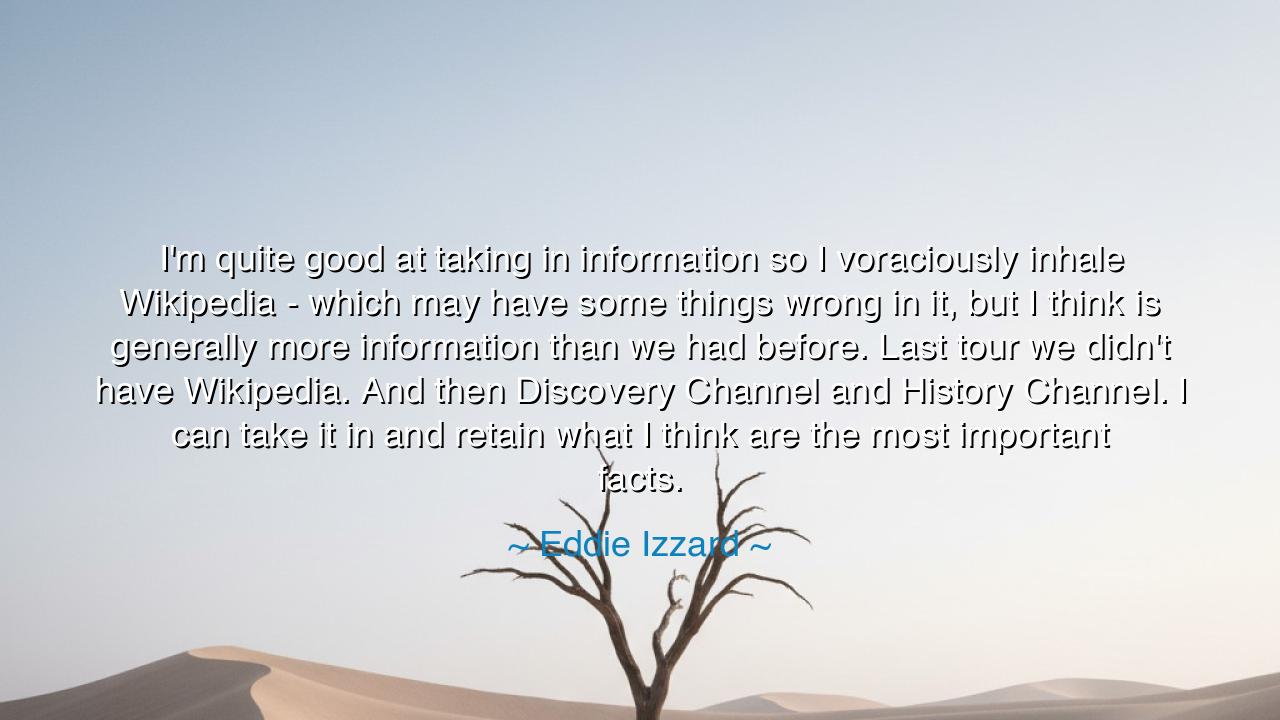
I'm quite good at taking in information so I voraciously inhale
I'm quite good at taking in information so I voraciously inhale Wikipedia - which may have some things wrong in it, but I think is generally more information than we had before. Last tour we didn't have Wikipedia. And then Discovery Channel and History Channel. I can take it in and retain what I think are the most important facts.






“I’m quite good at taking in information, so I voraciously inhale —which may have some things wrong in it, but I think is generally more information than we had before. Last tour we didn’t have Wikipedia. And then Discovery Channel and History Channel. I can take it in and retain what I think are the most important facts,” said Eddie Izzard, a comedian, actor, and thinker whose mind hungers not only for laughter, but for knowledge. His words are not merely about technology or curiosity—they are about the ancient human thirst for understanding, and how, in every age, new instruments of learning appear to feed that eternal fire. Beneath his playful tone lies a message that is both profound and timeless: that the wise are those who seek knowledge actively, sifting through imperfection to extract truth, and shaping information into wisdom through discernment.
In his quote, Izzard celebrates not the perfection of knowledge, but its abundance. He recognizes that the modern world, through the vast web of human creation, offers more information than ever before. Yet he also acknowledges its flaws, admitting that even great sources such as Wikipedia may contain errors. Still, he praises them as a triumph—a sign that human curiosity has found new wings. This humility and optimism combined form the essence of learning: the understanding that wisdom does not require flawless truth, but a willingness to search. For truth, like gold, must be mined from the dust of imperfection.
The ancients knew this well. The philosopher Socrates, who claimed to know nothing, spent his life questioning others not to prove superiority, but to refine thought through conversation. He understood that wisdom grows through engagement, not possession. In the same spirit, Izzard treats the flood of modern information as raw material for thought—a quarry from which meaning must be carved. His ability “to retain what I think are the most important facts” reveals the art of discernment, that most vital of intellectual virtues: to separate the enduring from the trivial, the valuable from the noise.
Consider the great Library of Alexandria, once the beacon of human knowledge. Within its walls rested scrolls from across the ancient world—mathematics, philosophy, astronomy, medicine. Yet even then, much of what it contained was imperfect, contradictory, or incomplete. Still, the scholars of that age did not despair at imperfection; they studied, compared, questioned, and refined. And though the Library itself was lost to flame, the wisdom it inspired—its spirit of inquiry—survived, carried through the centuries by those who refused to stop seeking truth amid uncertainty. So too does Izzard’s “voracious inhaling” of knowledge reflect that same timeless pursuit—the hunger of the human spirit to know, to connect, to understand.
In his use of modern tools like Wikipedia and educational channels, Izzard stands as a bridge between the ancient and the digital—the scholar of an age where knowledge is no longer hidden in temples, but scattered like seeds across the vast fields of the internet. Yet the principle remains the same: to learn is to cultivate discernment. Knowledge alone is not power; understanding is. Just as a sailor must read the stars to find his way, so must the learner read between the lines, questioning and interpreting, until truth emerges from the sea of data.
His words also speak of gratitude and evolution. “Last tour we didn’t have Wikipedia,” he says, reminding us that each generation inherits new tools from the last. The progress of civilization is built upon this layering of learning—each invention, from papyrus to printing press to digital cloud, widens the reach of human thought. Yet with each step forward, the same responsibility remains: to use knowledge wisely, to balance curiosity with judgment, and to let what we learn shape us toward compassion and understanding rather than arrogance.
And thus, the lesson of Eddie Izzard’s words becomes clear. Seek knowledge endlessly, but do not worship it blindly. Use every tool at your disposal, yet question what you find. Gather facts as the bee gathers nectar—not to hoard, but to create something nourishing and sweet. Let your mind be both open and disciplined; inhale the vastness of the world, but exhale meaning, insight, and truth. For wisdom is not measured by how much one knows, but by how deeply one understands.
So let the student of life, in every age, follow Izzard’s example: to be both voracious and discerning, both playful and profound in their pursuit of learning. Whether through books, screens, or the spoken word, let them drink from every well of knowledge with gratitude and care. For the world is vast, the truth often hidden, and yet—through curiosity and courage—we continue to search. And in that search lies the noblest mark of being human.






AAdministratorAdministrator
Welcome, honored guests. Please leave a comment, we will respond soon